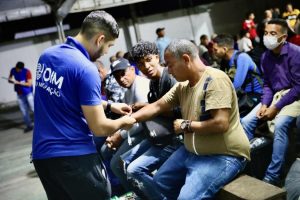Brazil’s refugee strategy lauded
Brazil’s strategy of resettling Venezuelan refugees and migrants fleeing dire economic and social conditions has been hailed a success by the United Nations.
The voluntary relocation program that has seen Venezuelans from the border state of Roraima settle in Brazilian cities has benefitted over 100,000 people since it was launched five years ago, according to Brazil’s Ministry of Social Development and Assistance.
The number represents nearly a quarter of the 425,000 Venezuelans living in Brazil.
 Individuals and families have been relocated from Roraima to more than 930 cities throughout Brazil, where they can find better opportunities to significantly improve their quality of life, make a greater contribution and achieve autonomy and integration.
Individuals and families have been relocated from Roraima to more than 930 cities throughout Brazil, where they can find better opportunities to significantly improve their quality of life, make a greater contribution and achieve autonomy and integration.
Women and children make up roughly 80 per cent of the beneficiaries.
A survey conducted among 2,000 Venezuelans who were part of the initiative found that they had better access to formal jobs, housing, and education programmes after being relocated and eight out of ten adults had found employment or started their own businesses.
“The relocation strategy guarantees protection and inclusion, providing effective ways for Venezuelans in the country to restart their lives with dignity,” said UNHCR Brazil representative Davide Torzill.
“Based around close collaboration between various institutions and organizations, the strategy represents an effective solution and a model for the region and beyond,” he said.
Before heading to other cities, Venezuelans who voluntarily participate in the relocation strategy receive proper documentation, including a national work permit and tax accreditation. They are also vaccinated in line with the national immunization schedule.
“Strengthening and improving inclusion through the relocation strategy is crucial for those who have decided to stay in Brazil,” Mr Torzill said.
“With the support of local governments, civil society organisations and the private sector, it is possible to promote long-lasting inclusion, allowing Venezuelans to break stereotypes, create solutions and contribute to the development of host communities.”
The strategy, known as ‘interiorisation’, was launched in 2018 as part of a program called Operation Welcome and is part of the Brazilian Government’s humanitarian response to the arrival of Venezuelan refugees and migrants.
It offers a lifeline and fosters integration by helping people find new job opportunities or reunite with family or friends in other parts of the country.
The relocation strategy and Operation Welcome are supported by the Interagency Coordination Platform for Refugees and Migrants from Venezuela (R4V), which is co-led by the International Organization for Migration (IOM) and UNHCR, the UN Refugee Agency.
It also sees the participation of 55 civil society organizations and other UN agencies in Brazil. Municipalities receiving the relocated Venezuelans also support the initiative.
Venezuelans have faced a worsening economic crisis and humanitarian emergency since 2014, and the country’s northern coasts have been particularly hard hit due to lack of tourism.












